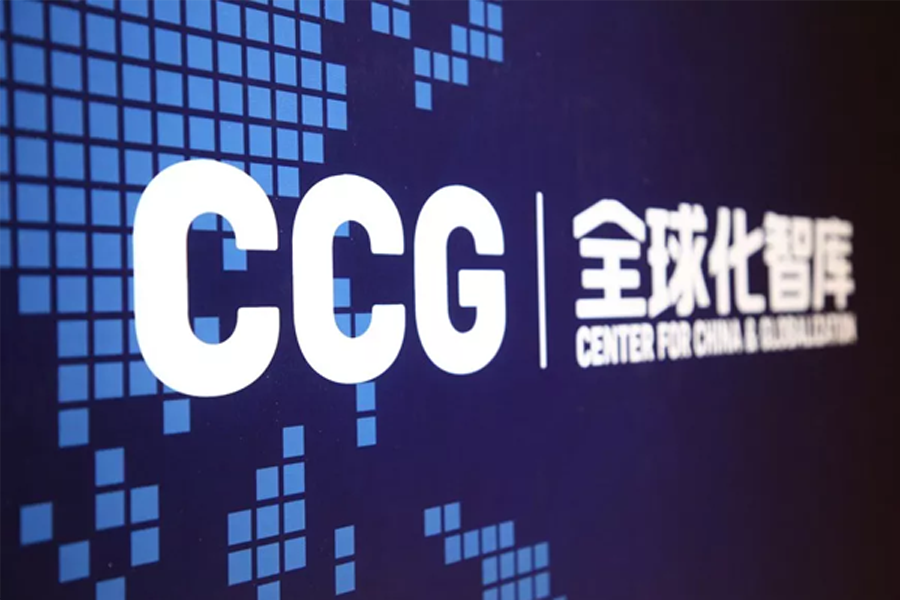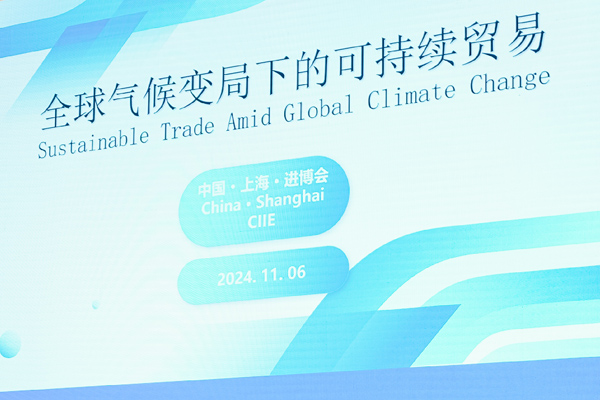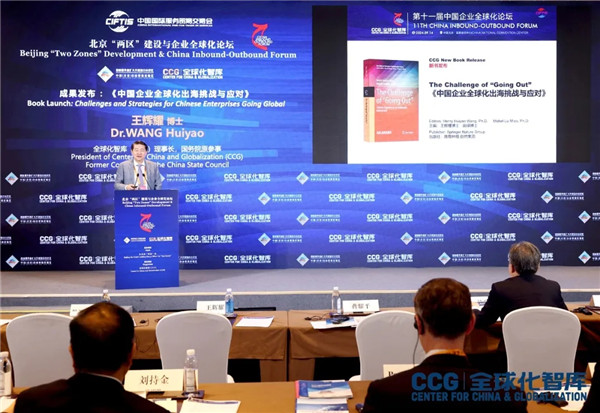The Inaugural Meeting of China Outbound Forum Starts in Sanya
January 19 , 2021Discuss and Shape the Next Wave of Globalization Among Chinese Firms as their Outbound Investment Exceeds FDI in China:
The inaugural meeting of the China Outbound investment Forum was successfully concluded on Nov. 23rd in Sanya, the world-famous resort city on scenic Hainan Island off the southeast coast of China. During the two-day conference, over 300 influential movers and shakers, including senior government officials, business executives, and academic experts from China and abroad, conducted an intensive and very fruitful high-level dialogue regarding the future direction of globalization among Chinese firms.
The Forum has been created to serve as a platform for discussing and undersanding this crucial phenonmenon by the Center for China and Globalization (CCG) and Smadja & Smadja Strategic Advisory. The Forum received full support from the Sanya Municipal Government and was jointly sponsored by the China Association of International Economic Cooperation (CAFIEC) of the Ministry of Commerce, China Association for the International Exchange of Personnel, the Industrial and Commercial Bank of China.
The creation of the China Outbound Investment Forum is a very timely initiative, as China’s outbound investment flows are expected this year to surpass foreign direct investment (FDI) into the country for the first time ever. In the first 10 months this year, China’s Overseas Direct Investment (ODI) reached $81.9 billion, up 17.8 percent from the same time last year. This trend is expected to gather an even greater momentum in the years ahead. China’s Government is now actively encouraging Chinese corporations to expand their activities beyond the mainland, while more and more companies are reaching the stage in their development when international expansion becomes the next logical step forward.
The theme of the Forum this year was billed as “Shaping the next Phase of Going Global,” reflecting the focus of the discussions on all of the strategic issues and hurdles involved in the international expansion of Chinese firms. These include financing for M&A activity, risk management, challenges in finding talented personnel, major compliance issues and their implications for Chinese companies, along with outbound investment opportunities in selected regions.
One of the Forum’s highlights was the recognition of the top 50 Chinese companies selected for their successful international expansion, top 50 emerging companies that have employed innovative strategies in going global, and top 50 Chinese companies publicly listed abroad. The latter were selected for their strong stock market performance. The recognized companies included both SOEs like Sinopec and private companies such as Huawei.
Agenda
Academically selected topics addressing key problems and opportunities in the globalization of Chinese companies.
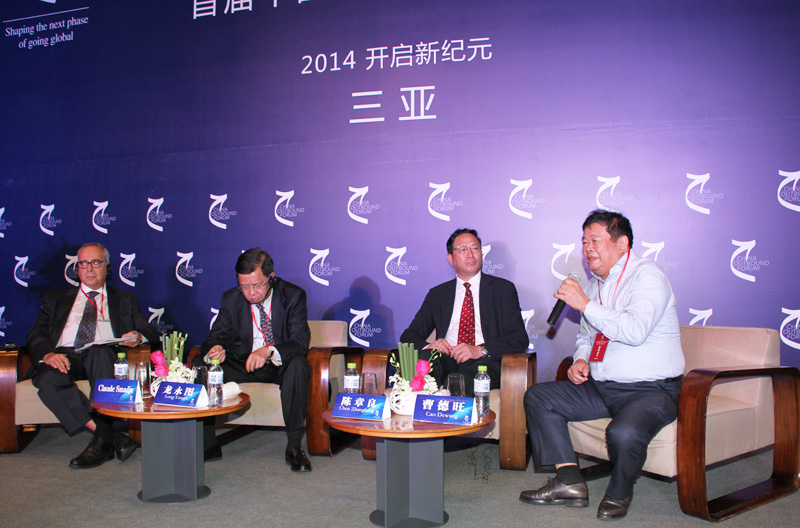 |
| Plenary session #1—When Going Global Becomes a “Must” |
Plenary session #1—When Going Global Becomes a “Must”: A company needs to determine whether it has the resources and competitiveness to successfully undertake global expansion.
 |
| Plenary session #2—China’s Going Global Strategy |
Plenary session #2—China’s Going Global Strategy: What It Means for Companies Expanding Abroad: International expansion is not simply a new step in a company’s development trajectory; it is instead best seen as a quantum leap requiring major changes in the modus operandi, management structure and corporate culture of firms.
 |
| Plenary Session #3—Addressing the Challenge of Finding the Talented Staff to Help Firms in Going Global |
Plenary Session #3—Addressing the Challenge of Finding the Talented Staff to Help Firms in Going Global: Recruiting and retaining individuals with the skills and expertise required for international expansion remains a challenge for many Chinese companies, which lack the capability to operate in an international setting consisting of different cultural environments.
 |
| Plenary Session #4—Financing International Acquisitions |
Plenary Session #4—Financing International Acquisitions: The strong momentum of China’s outbound investment, which niow exceeds FDI inflows into the country, highlights the need to improve financing for overseas M&A activity by Chinese companies.
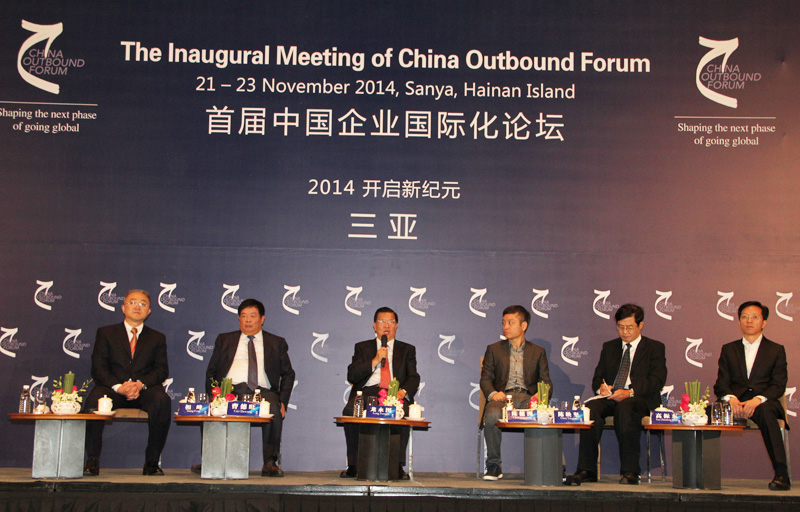 |
| Plenary Session #5—Learning from Success Stories |
Plenary Session #5—Learning from Success Stories: A number of Chinese companies have achieved considerable success in establishing their brands, capturing overseas market shares and becoming important global players in their respective sectors.
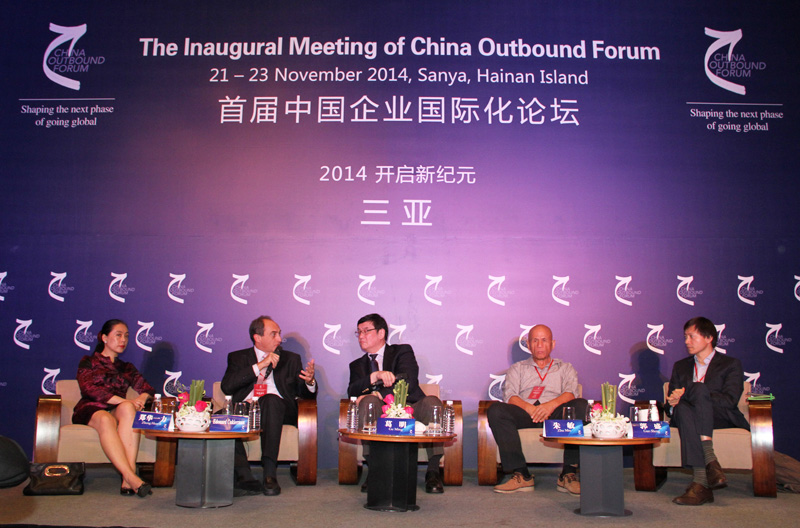 |
| Plenary Session #6—Successfully Managing IPOs |
Plenary Session #6—Successfully Managing IPOs: Successful IPOs require overhauling management resources, developing appropriate investor relations, establishing effective corporate governance, and setting up financial management practices conforming to global standards.
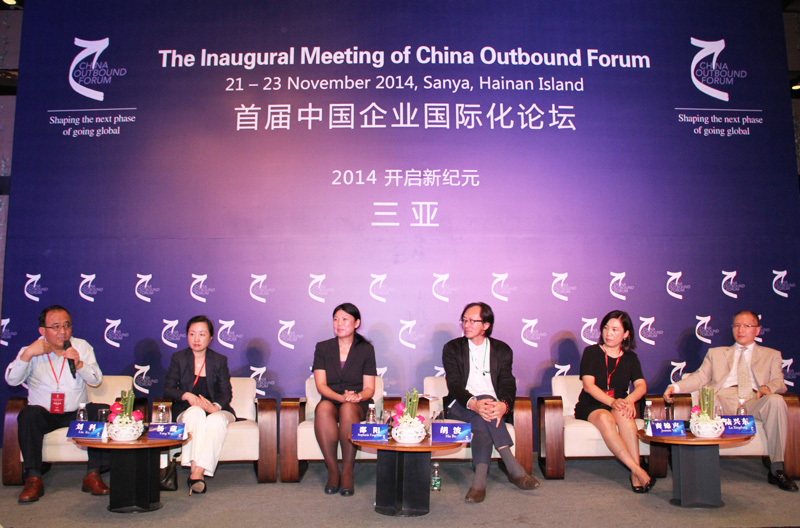 |
| Plenary Session #7—Creating the Culture and Brand for Going Global |
Plenary Session #7—Creating the Culture and Brand for Going Global: Chinese companies have lagged behind their international counterparts when it comes to creating the elements needed to establish strong, internationally recognized brands.
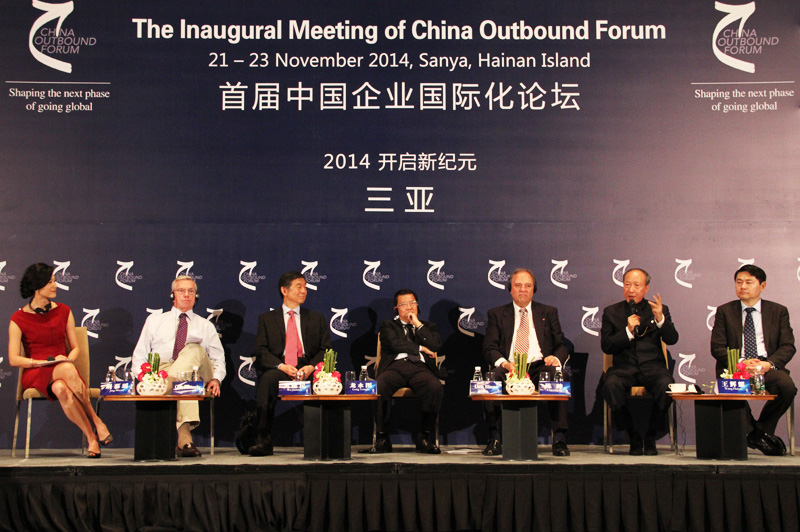 |
| Plenary Session #8—Loking Ahead |
Plenary Session #8—Loking Ahead: What Chinese Companies Need to Prepare for:
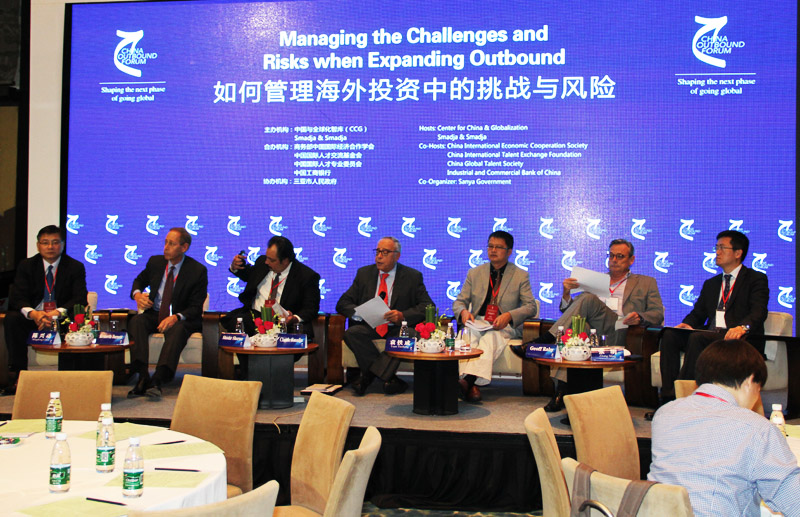 |
| Parallel Session #1—Managing the Challenges and Risks of Outward |
Parallel Session #1—Managing the Challenges and Risks of Outward Expansion:The Growing Number of Legal Compliance Requirements: Chinese corporations are facing a number of challenges in their international expansion, ranging from navigating through complex and stringent legal and fiscal compliance requirements to managing a new array of political uncertainties.
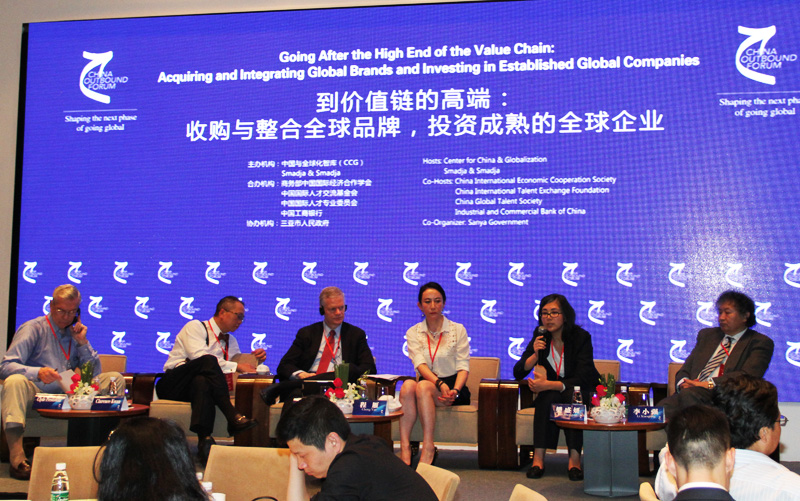 |
| Parallel Session #2—Going after the High End of the Value Chain |
Parallel Session #2—Going after the High End of the Value Chain: Acquiring and Integrating Global Brands and Investing in Established Global Companies: Chinese firms are increasingly acquiring established global brands and companies in target markets, as doing this is becoming the fast lane to establish themselves abroad.
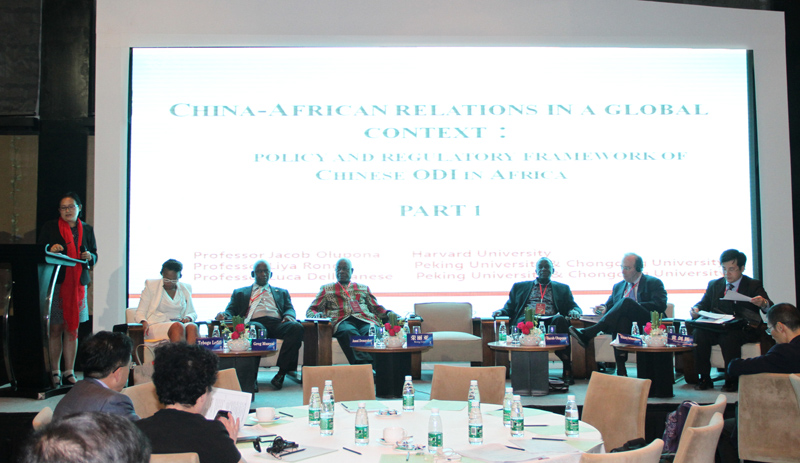 |
| Parallel Session #3—Exploring Opportunities in Africa for Chinese Companies |
Parallel Session #3—Exploring Opportunities in Africa for Chinese Companies:Chinese companies have been investing heavily in Africa, but remain limited to some specific sectors such as mining and commodities, infrastructure, and construction.
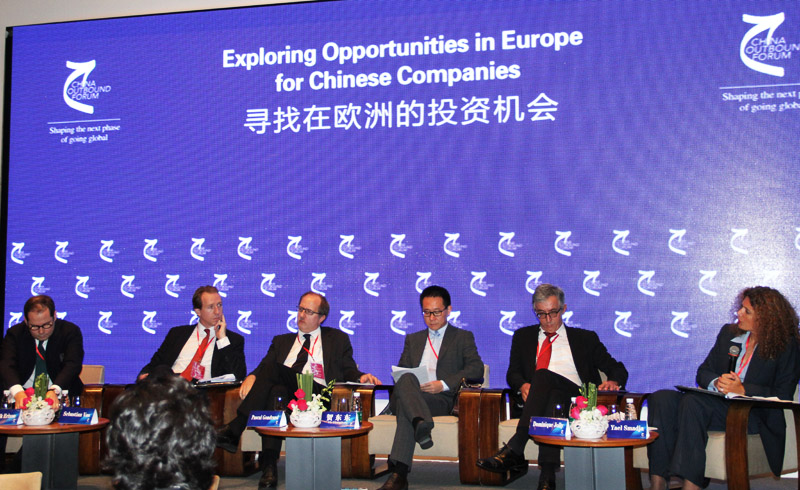 |
| Parallel Session #4—Exploring Opportunities in Europe for Chinese Companies |
Parallel Session #4—Exploring Opportunities in Europe for Chinese Companies: Although China’s investment drive in Europe has been making headlines, vast untapped potential still remains on both sides. One key obstacle continues to be the reluctance in Europe to sell high tech firms to Chinese corporations.
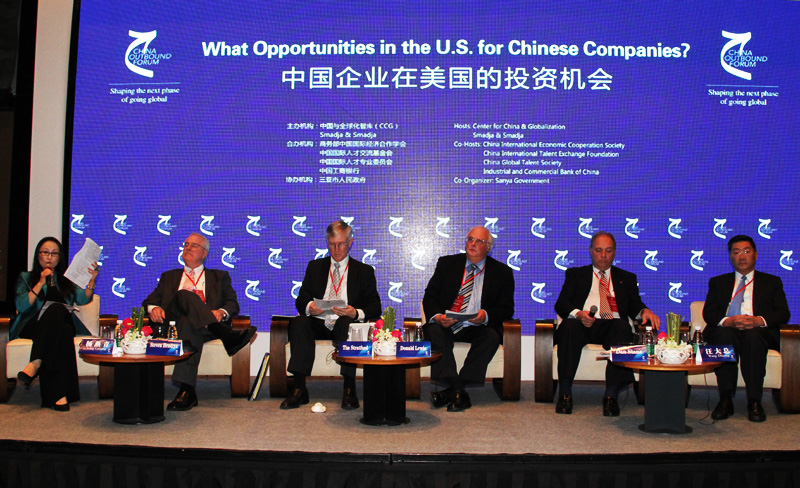 |
| Parallel Session #5—Opportunities in the US for Chinese Companies |
Parallel Session #5—Opportunities in the US for Chinese Companies: Despite geopolitical and national security concerns, Chinese investments are increasingly seen as a source of economic growth and job creation in the U.S.
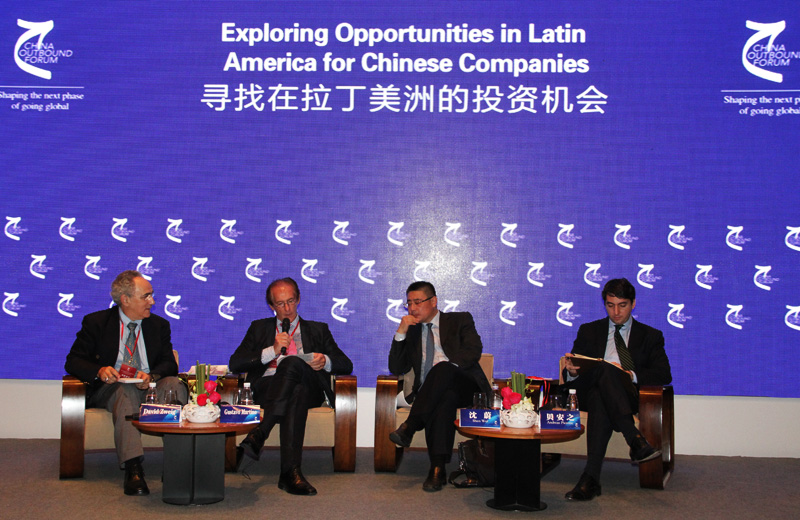 |
| Parallel Session #6—Opportunities in Latin America for Chinese Companies |
Parallel Session #6—Opportunities in Latin America for Chinese Companies:Chinese investment in Latin America has risen steadily across a wide array of sectors such as energy, agriculture, infrastructure, and construction.
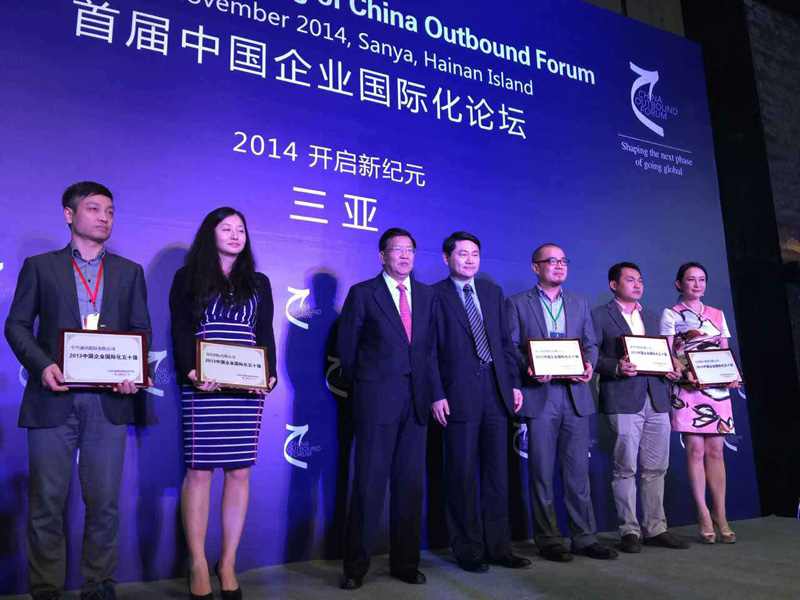 |
| Grand Awarding Ceremony: An evening of recognition of successful Chinese companies |
Grand Awarding Ceremony: An evening of recognition of successful Chinese companies
IMPACT
A Highly Significant Event
Marked by Tremendous Turnout, Extensive and Stimulating Discussion, and Wide Media Coverage
Thanks to the valuable contribution and strong support from all of the parties involved in planning and executing this event, the Inaugural Meeting of the Forum was a great success. This is reflected in the following numbers:
1
The Forum is the 1st high-level international conference in which Chinese thinktanks played a leading role. Their research on the globalization of Chinese firms provided important academic input to the meeting, shaping and guiding the structure of the dialogue. CCG, China’s largest independent think tank and the Forum’s major sponsor, laid a scientific foundation for the gathering with its Bluebook Report on the Globalization of Chinese Enterprises 2014. The Report details the current trends and major challenges for Chinese companies going global and introduces a new evaluation methodology for analyzing this phenonemonon.
7 +
The Forum has been created by extensive and diverse international collaboration involving over 7 organizations from the private and public sectors in China, while receiving support from many more companies, institutions, and government agencies.
14 +
The participants in the Forum hailed from over 14 countries, including most of China’s major outbound investment destinations, such as the U.S., E.U., and Australia, as well as emerging markets in Africa and Latin America. Diplomats from many of these countries, particularly the U.S., France, South Africa, Ghana, Argentina, and China, were also present at the conference to promote investment opportunities for Chinese companies.
18 +
The Forum presented 18 major events and seminars in two and half days. In addition to the grand opening and closing ceremony, the agenda included16 seminars tailored to the interests of the Forum’s audience focusing on different major issues in the globali-zation of Chinese firms. Its awards ceremony highlighted and celebrated the success of Chinese companies in going global. Luncheons, cocktail receptions, and sideline networking events also provided ample opportunities for generating further interaction among participants attending the Forum.
80 +
The Forum featured over 80 distinguished speakers who shared their insights and experience in the international expansion of Chinese companies. Among them were prominent political figures and leaders like the former Vice Minister of Commerce Mr. Long Yongtu, influential business executives such as Mr. Cao Dewang, the founder and chairman of Fuyao Glass Industry Group, the world’s largest auto glass producer, and many senior academic experts.
300 +
The Forum attracted more than 300 attendees, making it the most heavily attended highest level discussion on Chinese companies going global.
2 million +
The Forum generated massive media attention. Besides the three influential media partners—Sina, Caixin, and CBN—it also received extensive coverage from mainstream outlets, including Xinhua News, China News, CCTV and Phoenix TV. A Google search of the Forum generated over 2 million news items.
PERSPECTIVES
· An Inclusive Event
· Diverse Voices on a Great Variety of Issues
Based on CCG’s extensive academic research and case studies, as well as intellectual collaboration with other sponsoring bodies, the Forum identified the major issues and challenges in the globalization of Chinese companies. It then selected speakers with outstanding expertise and rich experience for each event, who shared their insights while skillfully addressing key issues and questions. A brief summary of selected speakers’ bios and views is as follows:
Official Opening
2014: The 2nd Turning Point in the Globalization of Chinese Companies
Mr. Huang Mengfu, Honorary Chairman, All China Federation of Commerce & Industry; former Vice-Chairman, Peoples Political Consultative Conference
There are two turning points in the globalization of Chinese firms. The first one occurred in 2001, when China joined WTO, while the second one took place in 2014, when China’s outbound investment flows are expected to surpass inflows of FDI into the country.
The benefits of China’s WTO entry are obvious—accelerated economic reform and development. However, new challenges also arose after China beame a WTO member. The biggest cchallenge is that the price of the goods China is producing have invariably tended to go down, while the price of what it purchases from abroad has invariably tended to rise. Due to these trends, China has been gradually losing its comparative advantage and needs to transform and upgrade its manufacturing industry. At the present time, international expansion has begun among not only Chinese SOEs, but privately owned companies as well. The latter are going to become the major force in Chinese outbound investment. They will have increasingly attractive opportunities to go global as China’s Government provides more policy incentives and support to encourage the globalization of Chinese companies, both public and private, including promoting regional trade development. These measures will help strengthen the comparative advantage of Chinese companies.
2014: A Watershed Year for China Outbound Investment
Dr. Wang Huiyao, Director, Center for China and Globalization
China’s outbound investment is expected to reach $120 billion in 2014, marking the first time in history when it will exceed FDI flowing into the country. It is high time for Chinese firms to enter a new era characterized by their increasing global expansion. Against this backdrop, the China Outbound Investment Forum has been launched to provide a significant and historical event in the study of the globalization of Chinese enterprises.
Plenary Session 1:
When Thinking about Going Global Becomes a Must and Behaving Globally before Going Global
Mr. Cao Dewang, Founder and Chairman of Fuyao Glass
To succeed in the global market, especially in developed countries, we have to first “think globally” and “behave globally.” This means staying open-minded, transparent, and respecting local rules. Fuyao Group has planned to invest $500 million in the U.S. We have hired most senior executives from the U.S. and only sent one from China as the Director of community relations. His primary responsibility is to work with local communities, governments, and schools to ensure that Fuyao behaves as a model corporate citizen in the U.S. market.
China’s Agriculture Needs to Step Up Efforts Going Global
Dr. Chen Zhangliang, Vice-Chairman, China Association of Science and Tech-nology; Former Vice-Chairman of the Guangxi Autonomous Region; Former President of the China Agriculture University.
Although China’s agricultural output has grown rapidly over the past decade, the country is still importing most of the agriculture commodities and goods it needs. Facing increasing food demand on the global market, China needs to push agriculture into going global as a way of ensuring its long-term food security. Despite many outbound investment opportunities for agriculture in the countries like the U.S., Vietnam, and Brazil, few outbound investments in this area have so far succeeded. Chinese companies that are exploring global agricultural market should employ more strategic planning to tackle the issues involved in such activity. These include local hiring, logistics and transportation, and knowing how to export final products back to China. The Chinese government should also collaborate with companies to promote outbound investment in agriculture.
Why China’s Outbound Investment is Gaining Momentum
Mr. Long Yongtu, former Vice-Minister of Commerce, and China’s Chief Negotiator for Its Admission to WTO, former Secretary General of the Boao Forum.
There are four reasons for Chinese companies to accelerate outbound investment. First, thanks to its rapid economic growth, China has become the world’s second largest economy. China’s stronger overall global economic competitiveness has provided an underlying base for Chinese companies to go global. Second, China has the world’s largest foreign exchange reserves, and these reserves can provide stable and adequate financial support for Chinese companies going global. It is also essential from China’s overall global strategic standpoint to have Chinese companies transform these vast foreign exchange reserves into into overseas assets through outbound investment activity. Third, many strategic policies were formulated and enacted in China to support domestic companies going global, such as the “One Road, One Belt” initiatie and “Silk Road Fund.” Fourth, there is a strong demand from the world economy for Chinese companies to go global and become a driving force for the integration of global capital, technologies, talented staff, and other resources.
Session 2: China’s Going Global Strategy
Chinese Outbound Investment Shows Three Trends
Mr. Cui Mingmo, President, Chinese Association of International Economic Coop-eration (CAFIEC).
Chinese outbound investment can be characterized as follows. First, it has achieved remarkable progress in the past decade, jumping from $2.8 billion in 2003 to $625.3 billion by the end of October, 2014. Second, the modes for China outbound investment are becoming diversified, moving from being limited to FDI to a whole range of investment activities, including cross-border M&A, Greenfield investment, and joint R&D projects. Third, more players are taking part in Chinese outbound investment. State-owned enterprises still account for over 50% of this activity, but the share taken by privately owned firms has been increasing rapidly and now stands at 44.8%.
“It was the Game Itself, Rather than Rules of the Game that have Changed”
Mr. Zhang Xinsheng, Former Vice- Minister, Ministry of Education; Chairman, UNESCO Executive Board.
The globalization of Chinese companiesenterprises is an inevitable trend—regardless of whether they intentionally expand abroad or not, they will all eventually be involved in the process of internationalizing business in China. Therefore, they have to prepare their own strategies to preempt the market in the new era of globalization.
Optimized Integration of Global Resources key to Going Global
Mr. Zong Qingsheng, Managing Director for Overseas Investment, China Minmetals Corporation
Reflecting on the path of China Minmetals’ globalization, its experience shows how important it is for a multinational company to efficiently integrate and optimize resources based on global market demand and to strategically position itself in the global market. For instance, China Minmetals is mainly focused on copper, lead, and zinc, while shunning iron mines, due to the high risks involved in their operation. Since it was founded in 1950, the company has transformed itself into a global industry leader with business operations in 34 countries and 177,000 employees worldwide. It has been nominated to Fortune World 500 List for eight successive years.
Plenary Session 3:
Addressing the Challenge of Finding Talented Staff when Going Global
How to Improve Global Competitiveness in Recruiting International Talent
Ms. Erica Wang, Senior VP for Human Resources, Hanergy Holding Group
As China’s largest private-own clean energy company, Hanergy is in dire need of skilled staff worldwide after it acquired four solar companies in US, Europe and Asia in the past two years. Around 80% of its overseas staff are local people. There are four types of talented individuals Hanenergy is most in need of. The first are innovative experts in the solar energy industry. The second are non-Chinese who are humble, adaptive, and willing to learn Chinese culture and Hanergy’s corporate culture. The third are highly qualified Chinese individuals with global perspectives who can help Hanergy explore international business opportunities. And the fourth consist of people who are familiar with local business environments and cultures. As one of its strategies for recruiting and retaining such individuals, Hanergy sets a high compensation standard for expatriates in China equivalent to that of foreign companies when they have just entered the Chinese market. For employees in markets overseas, Hanergy also provides compensation that is competitive on the local markets.
Developing the Talents of China’s Workforce Requires a National Strategy
Mr. Wang Guangfa, Chairman, Fazheng Group
Upgrading the capabilities of Chinese workers should be considered a national strategic priority, whose importance ranks up with other imperatives, like strengthening the rule of law, in addressing the need to transform China’s economic growth model to achieve sustainable development. The strategy needs to focus on long-term talent cultivation, providing lifetime education for this generation while preparing for the early education of the next generation.
Cross-border M&A: A Front-Line Test for in the Global Talent Quest
Mr. Tao Jingzhou, Managing partner, Dechert LLP.
Successful cross-border M&A deals require a strong professional team composed of auditors, accountants and experts in taxation, financing, communications, legal affairs, and government relations. In addition to acquiring such highly qualified and skilled individuals, it is also important to integrate all of them into a cohesive and collaborative team. Moreover, companies require different teams for each of the three phases in an M&A deal. These phases are negotiating and finalizing the deal, integrating the merged company, and exiting from the deal if necessary. The most important quality those involved in conducting this process need to have is the judgment to identify good M&A opportunities and the potential risks involved.
Importing foreign experts to accelerate Chinese talent development
Mr. Lei Fengyun, Deputy Director, State Administration for Foreign Experts
Since the Reform and Opening-up policy began, the Chinese Government has strongy supported the introduction of highly qualified and talented foreign individuals to promote China’s ecconomic development. As this trend gained momentum during these years, the number of foreign experts working in China increased to 612,000 by last year, with 1/3 of them in education, 1/3 in manufacturing industry, and the rest in other sectors. Since importing foreign experts also helps upgrade the skills and capabilities of Chinese workers, it will continue to receive support from China’s government and companies.
Individuals most in Demand by Global Companies Have Five Character Traits
Ms. Hypatia E. Kingsley, Greater China Country Manager, Spencer Stuart
There is strong agreement that that acquiring high qualified staff is the most important issue for Chinese companies going global. There are five character traits that are most sought after among personnel recruited to work in global companies. They must be humble, sensitive, curious, flexible, and good at communicating. Business executives with those character traits, along with a strong global vision, are most qualified to lead multinational companies. In this area, Chinese companies can learn a lot from foreign MNCs, who have accumulated rich experiences over the past 20 years of operating in China, when it comes to recruiting the best people. To acquire staff from the global talent pool, Chinese enterprises must be able to to search, evaluate, and develop global leadership. In addition, they should possess a global corporate culture and perspective to embrace diversity while preserving their own corporate values.
Parallel Seminar 1: Managing challenges and risks when expanding outbound
Geoff Raby, Co-Chair China Business Group Corrs Chambers Westgarth, Aus-tralia
While Chinese companies entering the Australian market are subjected to scrutiny by a governmental committee on foreign investment, the outcome of this process is usually positive. The committee will make sure that the foreign investment benefits the Australian people. Although no application has been rejected during the past few years, concerns have been voiced from Australian communities regarding the impact of foreign investment.
Kenneth Jarrett, President, American Chamber of Commerce in Shanghai
The attitude of the United States towards Chinese investors has improved a lot over the past decade. Ten years ago, there were hardly any cases of such investment. The complicated national security check process kept Chinese investors away. The U.S. Federal Government and local governments are now much more passionate about welcoming Chinese investment. At the same time, Chinese companies are becoming shrewder and more experienced in investing overseas. In the past, Chinese firms always boasted of their wealth while bidding for the highest prices; however, now they are much more realistic in dealing with such matters.
Shishir Sharma, Managing Partner Tatva Legal, India
Most successful Chinese investments in India have to overcome the challenge of the strained political relationship between China and India, with the two countries differing greatly not just in this area, but with respect to language eand culture as well. However, despite these obstacles, the value of two-way Sino-Indian trade has already reached $1 trillion. The bilateral relationship between the two countries began to improve after the signing of MOUs and agree-ments on cooperation.
Chen Xingdong, Managing Director, BNP Paribas, France
Many Chinese companies have encountered challenges when going global because of the lack of due diligence investigation. Up to now, two lessons should have been learned from overseas investment. It is first and foremost vital to spend a lot of time in risk evaluation. Second, political principles should not be mixed up with business objectives. Chinese companies, stated-owned companies in particular, are strongly recommended to set up a separate and independent department to assess the risks in all aspects, or have it done through a reputable consulting service.
Zhang Ming, Deputy Director, Department of International Finance Institute of World Economics and Politics (IWEP), Chinese Academy of Social Science
In 2014, the Chinese Academy of Social Science introduced the Country-Risk Rating of Overseas Investment from China. This system has the following main features. First, it evaluates the risks in multiple aspects, including economic, political, and legal risk, as well as any others which Chinese firms may encounter when investing abroad. Second, it focuses on direct investment. Third, it has five indicators—economic fundamentals, political risks, social flexibility, solvency, and relations with China—within which were 40 sub-indicators, such as the economic growth rate, government stability, and trading conditions. Fourth, in addition to sovereignty risk, the system also evaluates the industry and individual project’s risks. The risk assessment was divided into nine grades, with AAA representing the lowest risk rating and C-grades denoting highest risk rating. Germany was ranked No.1 in 2014 assessment on account of its advanced manufacturing technology.
Yuan Tiecheng, Founder & CEO, Riskon International.
There are security concerns in many places in the world, but security risk can be managed and controlled in a professional way. As a company specializing in managing non-business risks, we found in a survey that 111 out of the 162 countries examined experienced a deteriorating security environment over the past six years. These states included China. The security risks come from two aspects: the physical security in the host countries and the political risks brought to Chinese investment. Many Chinese companies failed in their outbound investment due to the failure to properly assess and manage risk.
Parallel Seminar 2: Going after the High End of Value Chain: Acquiring and Integrating Global Brands and Investing in Established Global Companies
John Jullens, Partner at Strategy &
The rising cross-border M&A activity of Chinese companies should be accompanied by an enhanced organizational capacity.
Many Chinese companies investing overseas are too focused on expanding their presence in the market, while neglecting building up their inner strength by improving quality and technology. For those that may not possess sufficient organizational capacity and experience to properly manage the M&A process and post-M&A integration, it is just as easy to expand globally through acquiring equity or by entering into contractual joint venture on specific projects, as opposed to doing an M&A.
Clarence Kwan, National Managing Partner, Chinese services group, Deloitte & Touche
A successful M&A has seven important factors.
The first is is a clear strategy that helps the company maximize profits and minimize costs. The second is a competent international team and standard transaction procedure. The third is a clearly-identified M&A target and well-defined strategic roadmap on how to actieve it. The fourth is a strong capacity to fulfill the M&A transaction. The fifth is a suitable international financial partner. The sixth is a solid connection with local authorities, legislators and other parties or individuals associated with the M&A deal. The last factor is sufficient funding and the requisite supply of skilled and talented individuals to carry out the M&A. To succeed in cross-border M&A deals, Chinese companies need to first obtain a large share of China’s domestic market, acquire experienced operational teams, and build up well-established business models and competitive financial strength.
Fan Shengyan, Managing Director, M&A Department, China Everbright Ltd.
When evaluating a potential M&A project, we will consider if and how much the technology involved can be adapted to the Chinese market and see if there are any alternative already existing in China.
Li Xiaoqiang, Managing Director at Healthcare Holdings, Fosun Group
Chinese companies may encounter very complicated situations and tough challenges processing M&A deals overseas, such as labor rules, prejudice against Chinese firms, and differing managerial styles and corporate cultures. These can all impose great pressure on Chinese businesses trying to go global. Developing strong learning capabilities can help the company accumulate the requisite knowledge and skills in a short time. Good relations with local governments, especially foreign investment regulatory authorities, along with local communities, is also important in gaining support for M&A deals.
Cheng Yan, Managing Director, Bank of China International Holdings, Ltd
We have noticed two trends in the Bank of China International Holdings’ 20 of years of experience in helping Chinese companies undertake cross-border M&A activity. First, many of their success stories started with obtaining cooperation from the companies to be merged. During that time, they acquired a good understanding of each other’s culture and achieved some level of business integration. The other trend is that Chinese companies are improving global management and branding through M&As, as China is transforming its economic growth model from one of being driven by infrastructure building to one based on domestic consumption and the services industry. That, in turn, has required firms to increase added value to become more competitive on the global market.
Parallel Seminar 3: Exploring opportunities in Africa for Chinese companies
Jacob Olupona, Professor of African Religious Traditions, Harvard Divinity School and Professor of African and African American Studies in the Faculty of Arts and Sciences,Harvard University Africa is one of the investment destinations with the highest rate of return. The continent has good investment opportunities in many sectors, which include telecommunications, infrastructure, raw materials, banking, and high-tech. However, China still facesmany challenges when investing in Africa, including mistrust, limited valuation of local human resources, low skill standard, and unfamiliarity withAfrican history and politics. Chinese firms have to learn to respect local African customs and cultures in order to build mutual trust and promote exchange.
Witney Schneidman, Senior International Advisor for Africa, Covington & Burling; former Deputy Assistant Secretary of State for African Affairs
China has invested heavily in Africa, particularly in infrastructure. The tips for investing in Africa in the future include above all zero tolerance for corruption and resort to local consulting services on investment.
Greg Munyai, Minister Counselor for Economic Affairs, South African Embassy to China
South Africa has a solid financial foundation and well-established legal system, which has made it a popular investment destination, particularly in the service sector. Chinese companies are encouraged to consider local employment when investing in South Africa and integrate their business operation with the local environment. It is necessary to point out that due to the food security concern, African countries have set trade barriers when it comes to transactions involving agricultural commodities and food products.
Anani Demuyakor, Ambassador of Ghana to China, Ghana
Before investing in Africa, foreign companies are strongly recommended to do long-term and extensive study of the African market. The sectors suitable for for-eign investment include transportation, agriculture and manufacturing.
Tebogo Lefifi, China Country Manager Brand South Africa
Chinese Government support is a major driving force for China’s investment in Africa. Aside from the mining industry, there are many sectors suitable for foreign investment, including education, R&D, and high-technology. Chinese companies should thoroughly examine every country’s development plan for the next 20 to 30 years and find an entry point for investing—doing that can make it easier for them to obtain political support. Maintaining good relations with local companies can also help them make sound investment decisions.
Huang Jianhui, Vice President of Research Institute of China Development Bank
A multifaceted strategy is needed in exploring business opportunities in Africa to improve not only infrastructure, but also education and governance. To design such a strategy, we need to first systematically integrate China’s reform and opening-up policy in the process of expansion in Africa, using the methodologies and best practices drawn from this highly successful effort to promote the growth of the Chinese economy. In addition, it is crucial to identify key investment areas with the greatest potential—energy, transportation, telecommunications, natural resources, industrial parks, agriculture, mineral mining, and aviation.
Parallel Seminar 4: Exploring opportunities in Europe for Chinese companies
Fredrik Erixon, Director, European Centre for International Political Economy, Brussels. Chinese companies need to consider three issues when investing overseas in Europe: 1) E.U. policies; 2) business operation in a market-oriented economy; and 3) the changes that may arise from Sino-E.U. bilateral trade negotiations. Chinese investors should attach particular importance to BIT negotiation and be careful with its political sensitivity. They are also strongly recommended to learn more about the political background and arbitration system in Europe.
He Dongdong, Vice President, Sanyi Industrial Group
We have made two investments in Germany, one being a greenfield investment, the other a company acquisition. The major challenges lie in product design, corporate culture management, branding strategies, and international political relations. The success we obtained from an overseas investment project investment depends on how effectively those problems are tackled.
Dominique Jolly, Professor at SKEMA Business School, Visiting Professor Center for China innovation at China-Europe International Business School (CEIBS), France
If Chinese companies want to expand their investments in Europe through M&A, China should allow European companies to invest more in the Chinese market to win the support of European governments. Another recommendation for Chinese companies investing in Europe is to devote more resources to R&D cooperation to develop technology.
Sebastian Vos, Partner, European Public Policy & Government Affairs Practice, Covington & Burling
The economy in Europe is improving somewhat, and more policies and measures are expected to promote investment and trade after the E.U. Parliament elects a new committee. This prospect could provide plenty opportunities for Chinese investors. Second, all E.U. members are more willing to host Chinese investment to improve domestic economy and boost job creation.
Pascal Gondrand, Chief Representative for Greater China, Invest in France Agency
Chinese investors have established a network in Europe. Their investments cover a lot of areas, including new industries and high-tech, services, and real estate. They invest in various ways, sometimes through purchasing shares in local companies and sometimes through wholly-owned businesses. France has a very good economic network for foreign investment. Many small and medium firms wish to cooperate with Chinese companies.
Plenary Session 4:
Financing international acquisitions
Wang Zilong, Managing Director, M&A Business, China International Capital Corpora

